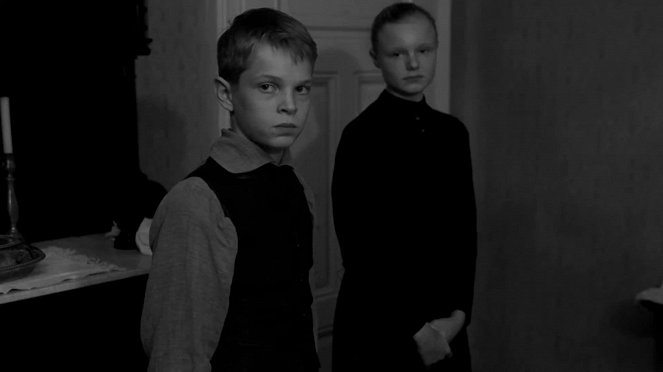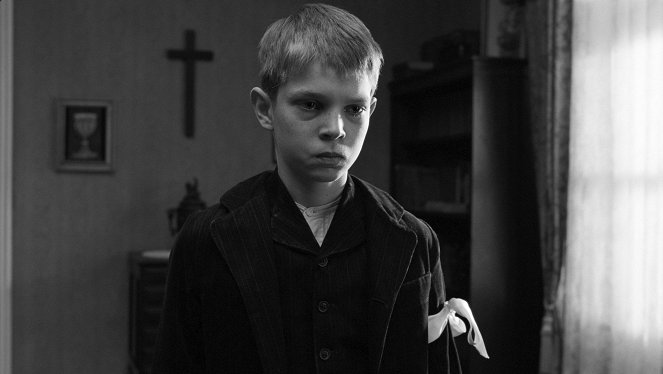Realização:
Michael HanekeArgumento:
Michael HanekeCâmara:
Christian BergerElenco:
Ulrich Tukur, Susanne Lothar, Rainer Bock, Christian Friedel, Leonard Proxauf, Leonie Benesch, Burghart Klaußner, Steffi Kühnert, Michael Schenk (mais)Streaming (1)
Sinopses(1)
Uma aldeia protestante da Alemanha do Norte. 1913/1914. Vésperas da Primeira Guerra Mundial. Uma história de crianças e adolescentes, pertencentes a um coro liderado pelo professor da aldeia, e suas famílias: o barão, o gerente, o pastor, o médico, a parteira, os camponeses. Acidentes estranhos acontecem e, gradualmente, assumem o carácter de uma punição ritual. Quem estará por detrás de tudo isso? (Leopardo Filmes)
(mais)Vídeos (3)
Críticas (8)
A melhor tese possível de um estudante em todos os cursos criativos da escola de filme. Sou um espetador que pode apreciá-la (e que adora a arte de Haneke), mas que em tempos passados se apaixonou por imagens cinematográficas sobretudo pela emoção.
()
That was awesome! A hard, unpleasant and very intense psychological drama. I’ve just watched it and I feel as if Haneke had ran me over with a steamroller. The White Ribbon is a truly impressive mosaic of relationships in an Austrian village before WWI that reveals the origins of human hatred and corruption. It’s almost like a realistic Twin Peaks.
()
The White Ribbon is not so much a dark thriller or even a crime drama as it is a journey into the early 20th century and a precisely executed depiction of the societal thinking and hierarchy of that time. It is a late patriarchal system where the word of the family breadwinner was law and upbringing took place not only in a strict religious but primarily authoritarian conservative spirit. Order, discipline, and authority, where many dark stories took place under the guise of orderliness, and many things were successfully swept under the rug. Masturbation was a crime, but sexual abuse was not addressed. Haneke is an excellent director and it shows in this film. The unsettling atmosphere of the village, far from civilization centers, where the advances of modern technology and modern liberal philosophical movements have not yet reached. I have a problem with some of Haneke's films, with his manipulation of the audience's emotions and unresolved endings, but he succeeded here. The unsettling ending with lots of dark suspicions, hints, and terrifying visions somehow fits into the period of the beginning of World War I and the end of that old quiet patriarchal society. Overall impression: 90%.
()
A personalized and surgically accurate analysis of evil in German society before the First World War. Haneke's analytical sadism, which deprives the viewer of a direct view of suffering, creates very unpleasant feelings on the body and soul. In its stylization, the deliberately cumbersome and static film is reminiscent of faded black-and-white photographs, but beneath their cold surface, it reveals a repulsive machinery of humiliation, class jealousy, perversions and injustices. Unfortunately, although The White Ribbon appealed to me intellectually (the film is brilliantly devised and completely rationally composed so that it can speak comprehensively), it missed the mark emotionally (despite the enjoyment from the director's brilliant approach, I remained only a cold observer throughout). It can therefore be assumed that the film will attract mainly fans of Haneke's depersonalized and exploratory view of the dark side of the human soul. For others, it can be either an enticing intellectual plaything, or deadly boredom.
()
A humanistic probe into the midst of a group of black-and-white human souls, almost without emotion and without the twist that we would automatically and adamantly demand in the case of conventional narrative scales, but with the most breathtaking and purest visual and acting representation of a filmmaker's vision in many years. A breathtaking clash of angelic innocence and harsh discipline with violent human depravity, where what matters is not the who or the why but the HOW - perhaps the only Haneke film where, if we accept the master's exacting psychological game, we will leave with a warm feeling not only as spectators but above all of pure moral awareness.
()




Publicidade